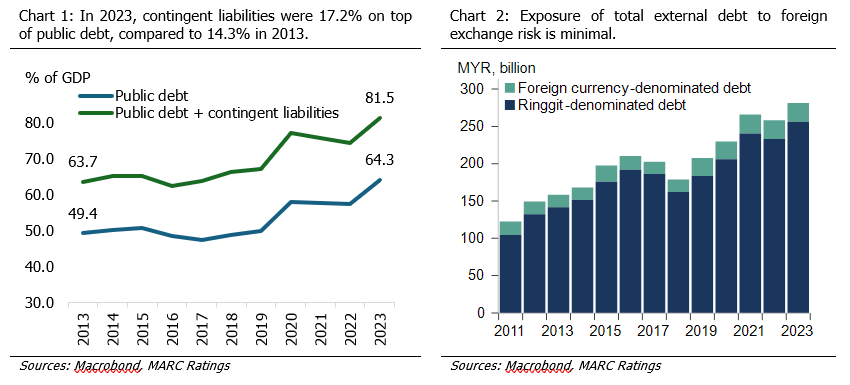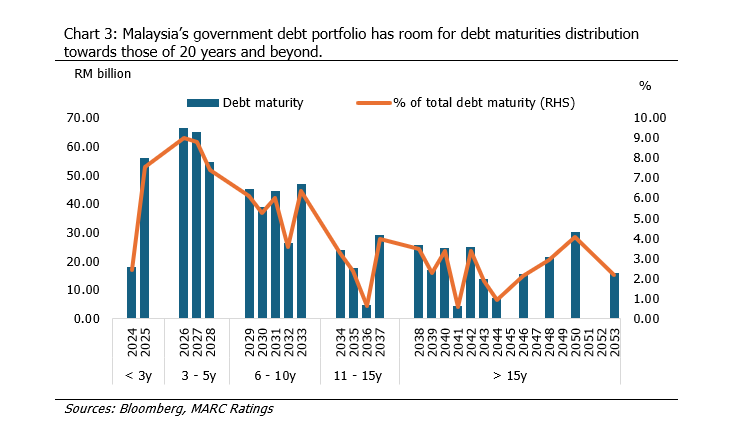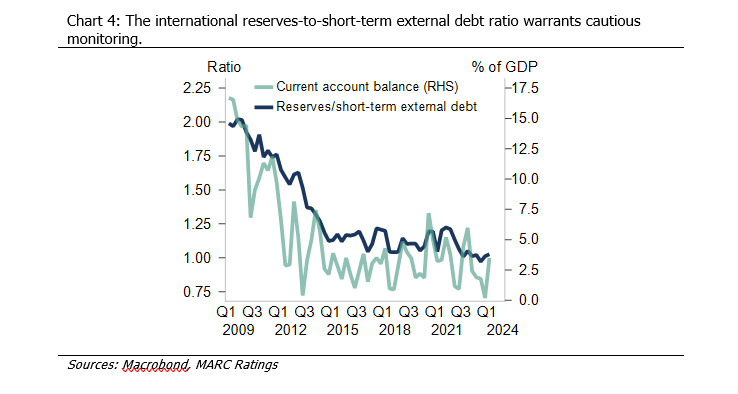This is a multi-part series of articles where we analyse the elements of fiscal sustainability through: i) government revenue and expenditures, ii) on– and off–government balance sheet items, and iii) innovative sustainability ratios. In this second part, we discuss the state of the country’s balance sheet.
Government debts can generate positive multiplier effects when allocated to productive projects and managed within a reasonable debt level. Conversely, prolonged elevated debt levels can constrain future fiscal space and impede economic growth.
Malaysia’s government debt as a share of gross domestic product (GDP) reached 64.3% in 2023 (2022: 60.2%), approaching the statutory debt limit of 65.0%, which was revised upwards from 60.0% in 2021. Since 2020, annually, government borrowings have grown 10.3%, surpassing the nominal economic growth of 5.1%. As at 1Q2024, government debt reached its highest level at RM1.21 trillion (4Q2023: RM1.17 trillion). Of note, higher government expenditures in response to pandemic stimuli have driven the rising trend in recent years. The experience during the pandemic showed the need for systematically building up contingency funds at regular intervals to mitigate major event risks. This would help expand the size of rainy-day or deficit-stabilisation funds, which can be actively utilised under defined criteria in the event of major adverse developments.
While Malaysia’s Public Finance and Fiscal Responsibility Act 2023 (FRA) has capped the government debt limit at 60.0% of GDP, the government has projected the debt ratio to remain elevated in the near term due to the gradual pace of fiscal consolidation efforts. The fiscal deficit target of 3.5% over the 2024-2026 period, exceeds our estimate of the debt-stabilising deficit, underscoring the risk of accelerating debt growth amid rising debt service charges, welfare-related costs, and persistent operating and development expenditures. Notably, the FRA does not specify the debt service charges (DSC) limit, with DSC as a share of revenue expected to increase to 16.2% in 2024 (2023: 14.7%), surpassing the previously self-imposed threshold of 15.0%. Nevertheless, as previously discussed in Part 1 of this series, ongoing fiscal reforms are expected to enhance the government’s capacity to meet the fiscal limits outlined in the FRA over the long term.
Off–balance sheet items, such as contingent liabilities, pose additional risks to debt sustainability. As at 2023, contingent liabilities were 17.2% of GDP compared to 14.3% of GDP in 2013. The FRA limits government guarantees, which constitute the bulk of the contingent liabilities, at 25.0% of GDP. Of note, a significant portion of government guarantee recipients has low or negative returns on assets. As some assets which bring about societal benefits generate poor financial returns by nature, the potential need for future capital injections remains. Contingent liabilities may also arise from government-linked companies within strategic sectors such as finance and utilities during situations of severe economic stress. Therefore, enhancing stronger accountability through clear goals, rigorous supervision and law enforcement, and transparent Public-Private Partnership (PPP) parameters are imperative to enhance the efficiency of balance sheet utilisation.
Effective debt management is crucial, particularly given the higher short-term debts issued since 2020 for pandemic spending. Short-term papers (less than three years) as a share of gross borrowings rose to 18.9% over the 2020-2023 period compared to 6.2% over the 2015-2019 period. Conversely, we note the weighted average time to maturity for outstanding debt securities has increased to 9.5 years in 2023 (2022: 9.0 years) due to a longer average time to maturity for 2023 issuances at 10.3 years (2022: 9.3 years). As at mid-2024, about two-thirds of Malaysia’s debt is set to mature within the next 10 years, showing a balanced maturity schedule. However, there is room to better distribute the debt maturities, especially towards bonds with maturities of 20 years or more, to improve the management of refinancing exposures.
Malaysia’s exposure to foreign exchange risk is minimal, with only 2.6% of government debt denominated in foreign currencies (2022: 2.7%). Although non-residents held 24.6% of the government debt in 2023 (2022: 23.9%), the level remains below the 2016 peak of 32.2%, limiting the risk of capital flight. The country’s strong net international investment position and deep, liquid domestic capital market also mitigate external risks. We note that the international reserves, while adequate, have declined to 1.0x the short-term external debt in 2023 from 2.0x in 2009, and it would be ideal to strengthen this position to buffer against external risks.
Malaysia has promising prospects for enhancing its fiscal health. Under the Debt Sustainability Analysis framework, developed by the Ministry of Finance, the International Monetary Fund, and the World Bank, Malaysia’s debt level could improve to below 60.0% of GDP by 2028 (2023: 64.3%) under a baseline scenario of an average GDP growth of 4.5% and funding cost with a 4.2% average coupon rate. While risks surrounding external growth and financing conditions have decreased, continued adherence to debt-stabilising policy measures is required to achieve a stronger and more sustainable fiscal position.
This press announcement is the second in a multi-part series enumerating our opinions over Malaysia’s fiscal health and considerations to be made in achieving fiscal sustainability.


